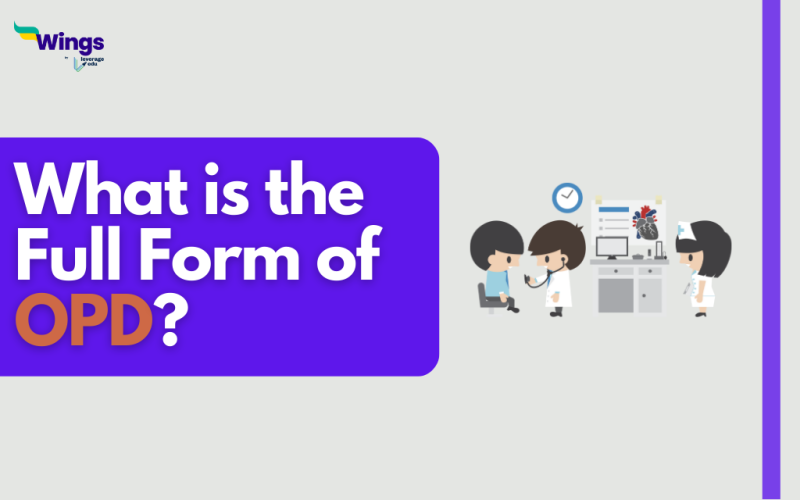The full form of OPD is the Outpatient Department. This unit of a hospital is the primary point of contact between patients and doctors. OPD of any healthcare facility is usually built on the ground floor of the building for the convenience of patients.
Each OPD unit is segregated into different specializations, viz. Department of General Medicine, Department of Orthopedics, Department of Neurology, Department of Gynaecology, Department of Oncology, Department of Urology, Department of Cardiology, Department of Psychiatry, ENT Department, etc. A patient suffering from specific diseases or discomfort in certain organs visits the concerned section of the OPD of a hospital to get consultation and treatment. Read this blog to learn more about “What Is the Full Form of OPD?”
OPD Advantages
Table of Contents [show]
Listed below are some of the advantages of the Outpatient Department:
- It serves as the initial point of medical consultation.
- It has facilities for X-rays, pathology, and other tests that are essential to determining the disease or disorder in a patient.
- Test reports are readily available in an OPD.
- The availability of specialized doctors in multiple branches of medicine helps distressed people seek consultation from medical professionals of varied fields.
- Treatment and consultation provided in OPD are administered and controlled systematically.
Differences between Outpatient and Inpatient
Tabulated below are the basic differences between outpatient and inpatient facilities in a healthcare facility:
| Outpatient | Inpatient |
| An outpatient is a distressed individual who gets medical care for a few hours without being hospitalised. | An inpatient is a sick or injured person who needs to be admitted overnight to a healthcare entity for at least one day. |
| The outpatient facility is available at hospitals and clinics. | An inpatient facility is available at hospitals, nursing homes, and clinics. |
Other Full Forms of OPD
Here is a list of other full forms of OPD:
- Once Per Day
- Ocean Physics Department
- Official Path Difference
- Office of Public Defense
- Original Pack Dispensing
- Office of Public Defense
- Overpressure Device
OPD Characteristics
The characteristics of an OPD (Out-Patient Department) can vary depending on the specific healthcare institution, but here are some common features:
- Consultations and examinations: OPDs provide facilities and medical personnel for consultations, examinations, and evaluations of patients. Doctors, specialists, and other healthcare professionals are available to assess patients’ conditions, provide medical advice, and prescribe appropriate treatments.
- Non-admission basis: Unlike in-patient departments, OPDs do not require patients to be admitted or stay overnight. Patients visit the OPD for medical services and return home afterward unless further specialized care or hospitalization is deemed necessary.
- Appointment-based or walk-in: OPDs may operate on an appointment-based system, where patients schedule their visits in advance, or they may allow walk-in patients without prior appointments. Appointment-based systems help manage patient flow and reduce waiting times, while walk-ins accommodate patients who require immediate attention.
- Variety of services: OPDs offer a wide range of medical services, including general consultations, diagnostic tests, laboratory investigations, minor procedures, vaccinations, preventive care, and follow-up visits for chronic conditions. The specific services available can vary based on the healthcare facility’s capabilities and specialization.
Also Read: Different Medical Courses After 12th
Also Read: Allied Health Science Courses, Universities & Careers
FAQs
- What does OPD stand for?
The full form of OPD is the Outpatient Department. - What services are available in an OPD?
OPDs offer medical consultations, diagnostic tests (like X-rays and pathology), and specialized treatments across various medical specialties. - Why is OPD important in a hospital?
OPDs provide convenient access to healthcare, allowing patients to receive non-emergency medical care without requiring hospitalization, thus reducing overall healthcare costs and hospital overcrowding.
We hope this blog has helped you understand the full form of OPD and everything related to it. If you want to know more, find the 300+ full forms list on our blog. In the world of short forms, you can rely on the Leverage edu page to know about more full forms like this! Connect with us, study abroad experts, to achieve your international dream today!
 One app for all your study abroad needs
One app for all your study abroad needs















 45,000+ students trusted us with their dreams. Take the first step today!
45,000+ students trusted us with their dreams. Take the first step today!
